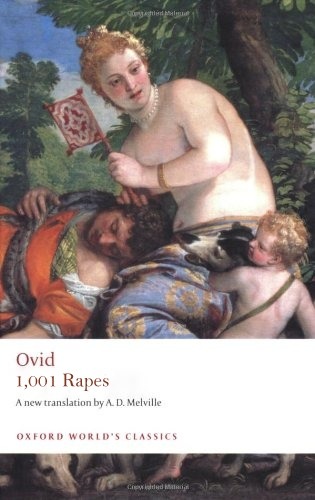
I have no remembrance of the time when I began to learn Greek. I have been told that it was when I was three years old. My earliest recollection on the subject, is that of committing to memory what my father termed Vocables, being lists of common Greek words, with their signification in English, which he wrote out for me on cards. Of grammar, until some years later, I learnt no more than the inflexions of the nouns and verbs, but, after a course of vocables, proceeded at once to translation; and I faintly remember going through Aesop's Fables, the first Greek book which I read. The Anabasis, which I remember better, was the second. I learnt no Latin until my eighth year. At that time I had read, under my father's tuition, a number of Greek prose authors, among whom I remember the whole of Herodotus, and of Xenophon's Cyropaedia and Memorials of Socrates; some of the lives of the philosophers by Diogenes Laertius; part of Lucian, and Isocrates' ad Demonicum and ad Nicoclem. I also read, in 1813, the first six dialogues (in the common arrangement) of Plato, from the Euthyphron to the Theaetetus inclusive: which last dialogue, I venture to think, would have been better omitted, as it was totally impossible I should understand it. But my father, in all his teaching, demanded of me not only the utmost that I could do, but much that I could by no possibility have done. What he was himself willing to undergo for the sake of my instruction, may be judged from the fact, that I went through the whole process of preparing my Greek lessons in the same room and at the same table at which he was writing: and as in those days Greek and English lexicons were not, and I could make no more use of a Greek and Latin lexicon than could be made without having yet begun to learn Latin, I was forced to have recourse to him for the meaning of every word which I did not know. This incessant interruption, he, one of the most impatient of men, submitted to, and wrote under that interruption several volumes of his History and all else that he had to write during those years. [...]
In my eighth year I commenced learning Latin, in conjunction with a younger sister, to whom I taught it as I went on, and who afterwards repeated the lessons to my father: and from this time, other sisters and brothers being successively added as pupils, a considerable part of my day's work consisted of this preparatory teaching. It was a part which I greatly disliked; the more so, as I was held responsible for the lessons of my pupils, in almost as full a sense as for my own: I however derived from this discipline the great advantage of learning more thoroughly and retaining more lastingly the things which I was set to teach: perhaps, too, the practice it afforded in explaining difficulties to others, may even at that age have been useful. In other respects, the experience of my boyhood is not favourable to the plan of teaching children by means of one another. The teaching, I am sure, is very inefficient as teaching, and I well knew that the relation between teacher and taught is not a good moral discipline to either. I went in this manner through the Latin grammar, and a considerable part of Cornelius Nepos and Caesar's Commentaries, but afterwards added to the superintendence of these lessons, much longer ones of my own.
In the same year in which I began Latin, I made my first commencement in the Greek poet with the Iliad. After I had made some progress in this, my father put Pope's translation into my hands. It was the first English verse I had cared to read, and it became one of the books in which for many years I most delighted: I think I must have read it from twenty to thirty times through. I should not have thought it worth while to mention a taste apparently so natural to boyhood, if I had not, as I think, observed that the keen enjoyment of this brilliant specimen of narrative and versification is not so universal with boys, as I should have expected both a priori and from my individual experience. Soon after this time I commenced Euclid, and somewhat later, algebra, still under my father's tuition.
From my eighth to my twelfth year the Latin books which I remember reading were, the Bucolics of Virgil, and the first six books of the Aeneid; all Horace except the Epodes; the Fables of Phaedrus; the first five books of Livy (to which from my love of the subject I voluntarily added, in my hours of leisure, the remainder of the first decade); all Sallust; a considerable part of Ovid's Metamorphoses; some plays of Terence; two or three books of Lucretius; several of the Orations of Cicero, and of his writings on oratory; also his letters to Atticus, my father taking the trouble to translate to me from the French the historical explanations in Mongault's notes.
In Greek I read the Iliad and Odyssey through; one or two plays of Sophocles, Euripides, and Aristophanes, though by these I profited little; all Thucydides; the Hellenics of Xenophon; a great part of Demosthenes, AEschines, and Lysias; Theocritus; Anacreon; part of the Anthology; a little of Dionysius; several books of Polybius; and lastly Aristotle's Rhetoric, which, as the first expressly scientific treatise on any moral or psychological subject which I had read, and containing many of the best observations of the ancients on human nature and life, my father made me study with peculiar care, and throw the matter of it into synoptic tables.
During this time, the Latin and Greek books which I continued to read with my father were chiefly such as were worth studying, not for the language merely, but also for the thoughts. This included much of the orators, and especially Demosthenes, some of whose principal orations I read several times over, and wrote out, by way of exercise, a full analysis of them. My father's comments on these orations when I read them to him were very instructive to me. He not only drew my attention to the insight they afforded into Athenian institutions, and the principles of legislation and government which they often illustrated, but pointed out the skill and art of the orator -- how everything important to his purpose was said at the exact moment when he had brought the minds of his audience into the state most fitted to receive it; how he made steal into their minds, gradually and by insinuation, thoughts which, if expressed in a more direct manner would have aroused their opposition. Most of these reflections were beyond my capacity of full comprehension at the time; but they left seed behind, which geminated in due season.
At this time I also read the whole of Tacitus, Juvenal, and Quintilian. The latter, owing to his obscure style and to the scholastic details of which many parts of his treatise are made up, is little read, and seldom sufficiently appreciated. His book is a kind of encyclopaedia of the thoughts of the ancients on the whole field of education and culture; and I have retained through life many valuable ideas which I can distinctly trace to my reading of him, even at that early age. It was at this period that I read, for the first time, some of the most important dialogues of Plato, in particular the Gorgias, the Protagoras, and the Republic. There is no author to whom my father thought himself more indebted for his own mental culture, than Plato, or whom he more frequently recommended to young student. I can bear similar testimony in regard to myself. The Socratic method, of which the Platonic dialogues are the chief example, is unsurpassed as a discipline for correcting the errors, and clearing up the confusions incident to the intellectus sibi permissus, the understanding which has made up all its bundles of associations under the guidance of popular phraseology. The close, searching elenchus by which the man of vague generalities is constrained either to express his meaning to himself in definite terms, or to confess that he does not know what he is talking about; the perpetual testing of all general statements by particular instances; the siege in from which is laid to the meaning of large abstract terms, by fixing upon some still larger class-name which includes that and more, and dividing down to the thing sought -- marking out its limits and definition by a series of accurately drawn distinctions between it and each of the cognate objects which are successively parted off from it -- all this, as an education for precise thinking, is inestimable, and all this, even at that age, took such hold of me that it became part of my own mind. I have felt ever since that the title of Platonist belongs by far better right to those who have been nourished in, and have endeavoured to practise Plato's mode of investigation, than to those who are distinguished only by the adoption of certain dogmatical conclusions, drawn mostly from the least intelligible of his works, and which the character of his mind and writings makes it uncertain whether he himself regarded as anything more than poetic fancies, or philosophic conjectures. In going through Plato and Demosthenes, since I could now read these authors, as far as the language was concerned, with perfect ease.




















